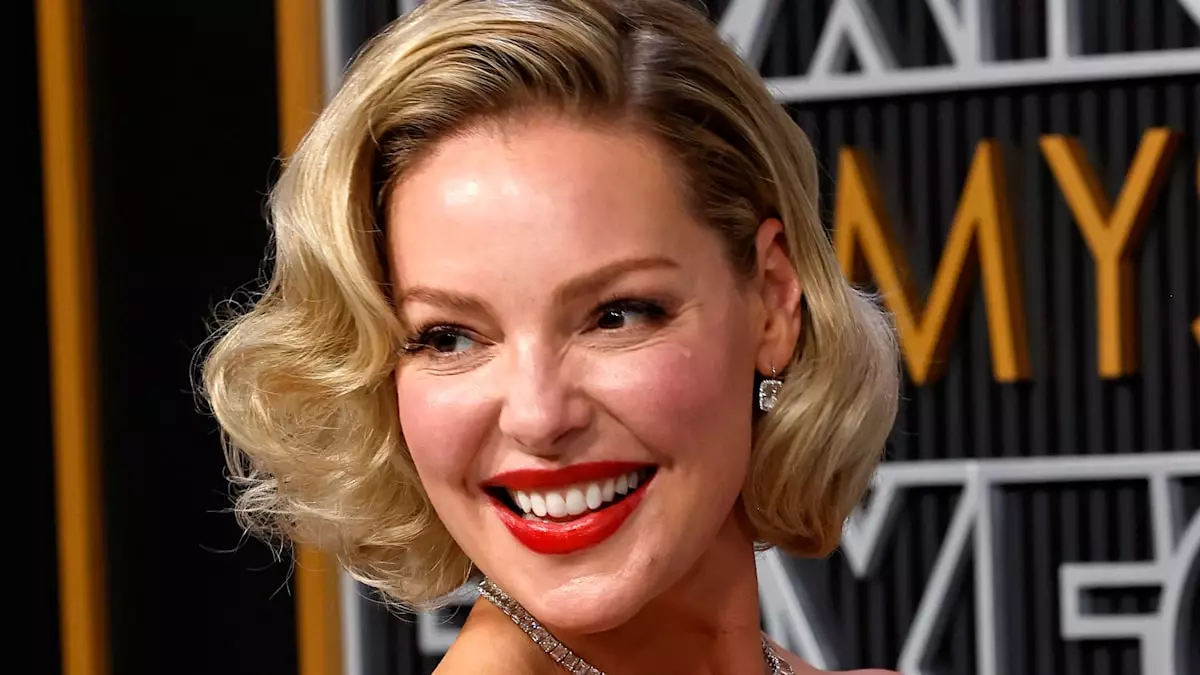Katherine Heigl, an Emmy-winning actress renowned for her memorable performances in “Grey’s Anatomy” and the romantic comedy “27 Dresses,” is now tackling a topic that remains shrouded in taboo for many women: light bladder leakage during perimenopause. In her latest endeavor, Heigl has partnered with Poise, a brand specializing in bladder leak protection, to launch the relatable and engaging “giggle dribble” campaign. This initiative aims to foster open conversations around perimenopause and its effects on women’s health.
In the campaign, Heigl elegantly combines humor with education. The concept of “giggle dribble” illustrates an experience shared by a large number of women, often stemming from childbirth, aging, or hormonal changes that occur during perimenopause. A light-hearted brunch scene serves as the backdrop for this message, wherein a fit of laughter leads to a moment of accidental leakage for her friend, prompting Heigl to shift the conversation from embarrassment to enlightenment. By providing her friend with a Poise liner, she reflects a metaphorical gesture of support, reinforcing the idea that sharing experiences can ease many burdens.
Through a candid dialogue in an exclusive interview, Heigl articulates her frustrations about the lack of support offered by medical professionals during her own journey through perimenopause. She emphasizes the disconcerting feeling of being disconnected from one’s own body as hormonal changes take hold. “You’re kind of alone in it,” she states, resonating with countless women who have grappled with similar feelings of isolation. This backdrop of loneliness, mixed with the effects of aging, highlights the pressing need for community and dialogue around these experiences.
Heigl passionately advocates for normalizing discussions about perimenopause, asserting its significance as a natural, albeit often neglected, aspect of women’s lives. “Why can’t we just talk about it?” she asks, seeking to challenge the notion that certain topics should remain taboo. By speaking openly about light bladder leakage and other perimenopausal symptoms, Heigl encourages a societal shift towards acknowledgment and understanding, which can fight stigma and promote self-acceptance.
Reflecting on her own experiences, Heigl shares stories of her early encounters with bladder leakage postpartum; she recounts a blend of humor and reluctance to feel shame. However, she acknowledges that perimenopause exacerbates these struggles, inducing feelings of defeat that need to be confronted rather than hidden. Comical interactions with her sister demonstrate the fallout of these changes, providing lighter anecdotal insight into the familial experience of navigating such a challenging phase of life.
Heigl articulates the intricacies of emotional fluctuations that come with perimenopause, including mood swings, fatigue, and cognitive difficulties. Through her honesty, she sheds light on the feelings of loss—loss of old selves, energy, and clarity—that many women face during this transition. This emotional turbulence can lead to feelings of inadequacy and the desire to hide from societal perceptions, which is a reality Heigl fervently aims to confront.
Ultimately, Heigl’s initiative is about building a community and encouraging women to embrace their shared experiences during perimenopause. Acknowledging that solidarity can provide comfort, she suggests that simply having someone else to confide in can mitigate the sense of alienation many women feel. This perspective symbolizes a broader movement advocating for empowerment through shared narratives and connection, transforming challenges related to aging into opportunities for dialogue and support.
Katherine Heigl’s candid discussion surrounding perimenopause and bladder leakage signifies more than just a campaign; it is a movement to empower women to reclaim their narratives as they age. By fostering conversations that were once deemed too uncomfortable to entertain, she is encouraging the next generation to embrace their experiences without shame, helping to smooth the often turbulent waters of women’s health from one “giggle dribble” to the next.

